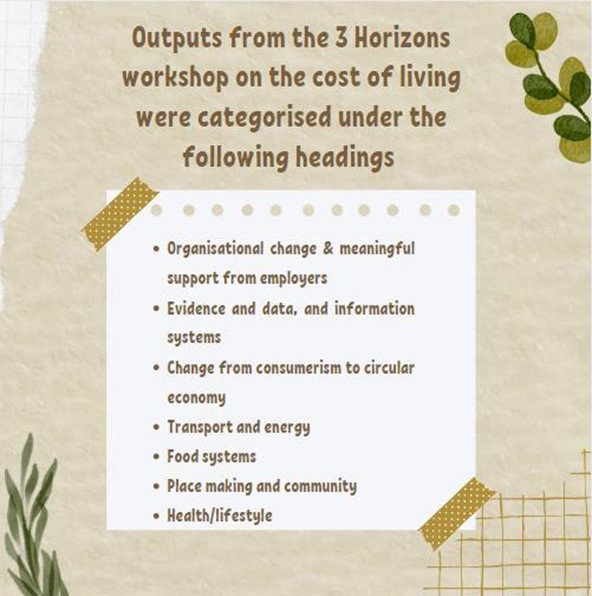The Vale PSB has always been committed to a strong collaborative approach and recognises the need for greater involvement from a range of partners and for residents to have their say.
During the development of our Well-being Assessment and Well-being Plan we have undertaken extensive community engagement and consultation work to determine our priorities.
Through engaging with a range of stakeholders, we have used the results to inform and shape our Well-being Plan and its Objectives. This has ensured that the priorities of the Well-being Plan are in line with the priorities of those living and working in the Vale.
The consultations we have carried out to inform the Well-being Plan included:
- Summer youth engagement events
- PSB Stakeholder Workshop
- Let’s Talk Survey
- Well-being Assessment Consultation
- About Life in the Vale consultation
- Cost of Living 3 Horizons Futures Workshop
- Equality Consultative Forum
- PSB/Town and Community Council Exchange meetings
- Vale PSB, Cardiff PSB, Regional Partnership Board (RPB) Strategic Priorities Workshop
- 12 weeks consultation on the draft plan inc. an on-line survey
- Discussions about climate change and the cost of living with the Youth Council Age Friendly engagement events.

In addition to the consultation and engagement undertaken by the PSB as part of the development of the Well-being Assessment and Plan we have also considered other consultation and engagement exercises undertaken by partners including the all Wales conversation ‘Nature and Us’, undertaken by Natural Resources Wales, the Vale of Glamorgan Council budget consultation and consultation on the Public Participation Strategy.
Some of these activities were aimed at understanding the views of the public and hearing their priorities directly. Whereas other activities such as the Vale PSB, Cardiff PSB, RPB Workshop heard from a range of stakeholders and discussed strategic priorities across partnerships.
During the 12-week formal consultation period the draft Well-being Plan received several comments from a variety of stakeholders. There was a general sentiment of support for the Plan and its objectives, as well as some recommendations for improvement. Several stakeholders praised the focus on the climate and nature emergencies in the Plan, and most offered their support for a collaborated approach to achieving the objectives.
Additionally, there were formal responses from organisations such as Natural Resource Wales (NRW), Welsh Government and the Future Generations Commissioner. These responses contained support for the draft Plan and suggestions for improvement, which have been incorporated into the final version. The comments made included re-formatting suggestions, consideration of timescales and monitoring of actions, and a greater emphasis on culture.

There was also praise for the engagement and collaboration undertaken to develop the Plan and encouragement to continue this practice. The 12-week consultation period included an online survey that received 107 responses. There were several emerging themes from the consultation responses, with Climate Change being an issue that generated a range of opinions. There was a lot of support for protecting our environment and increasing green spaces. However, there were some responses that questioned the priority level of climate action for local organisations. Additionally, there was a focus on communication as many respondents emphasised the importance of listening to our communities. There was a mix of responses with some feeling ignored and asking for more interaction, while others expressed agreement with the objectives in the Plan highlighting effective engagement.
Throughout our engagement process we have collated and discussed the key themes and priorities that were produced. Across all of the consultations, common themes were raised showing there are certain priorities that those in the Vale have and expect public services to respond to.
Especially prevalent was the support for climate change related issues such as increasing renewable energy and improving air quality in the Vale. There was also support for more active travel such as cycle lanes, as well as making transport more sustainable, available, and affordable. Improving green spaces and increasing biodiversity were key priorities when people considered the environment and their own well-being. Furthermore, a reduction in waste including food and energy was an important priority with people suggesting there should be a push for a circular economy with increased recycling and re- use. Linking to this was the call for increased local food production, with some asking for more allotment and community garden spaces.
Additionally, there were common themes surrounding place making and infrastructure which included priorities such as improved access to services and public transport. Many people we consulted with raised concerns regarding access to public transport and poor internet access especially in the rural Vale.
Moreover, public facilities such as toilets and seating were also a priority as well as fixing uneven pavements. Opportunities to undertake activities especially for young people was an important topic, which linked to concerns around anti-social behaviour. These priorities tie-in to the Vale being an age friendly place, with people from all age groups tending to see these issues as significant.
The Youth Council echoed concerns surrounding Climate Change and the Cost-of-Living crisis that other groups have voiced. Additionally, members of the Youth Council had strong views on the provision of public transport, arguing that it should be made more accessible and affordable for young people.
Engagement and conversations around making the Vale more age friendly are continuing and will inform an age friendly action plan. Issues raised include transport, digital exclusion, social isolation and the cost of living.
The information gathered through the various engagement activities has shaped our Plan and will continue to shape our work as we deliver our Objectives and take the steps necessary to address the issues detailed in this Plan and ensure we are contributing to all of the national Well-being Goals.